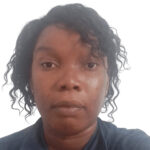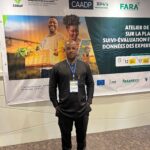
TAVARES Jacques
Company: INSTITUT NATIONAL DE RECHERCHE ET DE DEVELOPPEMENT AGRICOLE (INIDA)
Position: DIRECTEUR DE LA RECHERCHE, INNOVATION ET TECHNOLOGIE
Expert Summary
Je suis chercheur en développement rural et mes recherches sont orientées dans plusieurs domaines, notamment la dégradation et conservation des sols, l’horticulture, le développement rural et la gestion de projets. Cela fait plus de 20 ans que je travaille dans ces domaines. J’ai coordonné une dizaine de projets de développement agricole et rural avec plusieurs entités : OCP-Maroc, BAD, BADEA, UE, FAO, PNUD. J’ai dirigé la Direction des Services de la Sylviculture et Génie Rural de la Direction Générale de l'Agriculture, Sylviculture et Elevage du Ministère de l'Agriculture et de l'Environnement (DGASP-MAA), La Coordination des Laboratoires de Sol et Géospatial de l’INIDA-MAA. Depuis 2022, j'assume la Direction de Recherche, Innovation et Technologie et la Direction de l’Agriculture et Elevage de l’INIDA-MAA.
Publications
|
Publications Scientifiques (comme auteur principal & co-auteur) 1. Mapping of soil erosion risk in Santiago Island, 2007. In “Africa Geosciences Review” 2. Aloe Vera- Life Barriers in Cape Verde. In Book “Sustainable Land Management in Practice. Guidelines and Best Practices for Sub-Saharan Africa, 2008. Edited by TerrAFrica. Préparé par WOCAT et Coordonné par FAO ” 3. Efficiency of overland and erosion mitigation techniques at Ribeira Seca, Santiago Island, Cape Verde, 2012. In the Book “Overland Flow and Surface Runoff in Hydrological Science and Engineering-www.novapublishers.com” 4. Aloe Vera- Living Barriers, 2009. In the Book “DESIRE for Greener Land-Options for Sustainable Land Management in Drylands by WOCAT” 5. Afforestation in Cape Verde, 2010. In “DESIRE for Greener Land-Options for Sustainable Land Management in Drylands pelo WOCAT” 6. Training Information and Awareness. Publicado em 2012 no Livro “DESIRE for Greener Land-Options for Sustainable Land Management in Drylands pelo WOCAT” 7. Water Erosion and land Degradation in Cape Verde, 2009. In the Book CABO VERDE: Análise Socio ambiental e Perspectivas para o Desenvolvimento Sustentável em Áreas Semiáridas. 8. Assessment and Mapping of Desertification Sensitivity in an Insular Sahelian Mountain Region _ Case study of Ribeira Seca Watershed, Cape Verde (Poster presented in the “European Geosciences Union – Vienne in 2012”. 9. Appraising and selecting strategies to combat and mitigate Desertification based on stakeholder knowledge and global Best practices in Cape Verde Archipelago. REVIEW: Land Degradation & Development. Land Degrad. Develop. 25: 45–57 (2014). Published online in Wiley Online Library (wileyonlinelibrary.com) DOI: 10.1002/ldr.2273 10. Selecting best mapping strategies for storm runoff modeling in a mountainous semi-arid area. EARTH SURFACE PROCESSES AND LANDFORMS. Earth Surf. Process. Landforms 39, 1030–1048 (2014). (wileyonlinelibrary.com) DOI: 10.1002/esp.3501. 11. Assessment and mapping the sensitive area to desertification in an insular Sahelian mountain region- A case study of the Ribeira Seca Watershed of Cape Verde, 2015. REVIEW: Catena 12. Watershed Management Technologies to Boost the Resilience of Cape Verde to Climate Change and to Mitigate the Effects of Desertification. FAO, 2016. 13. Watershed management technologies to strengthen Cape Verde's resilience to climate change and to mitigate desertification effects, 2015. In FAO Review “Nature & Faune journal - Volume 30, Issue No. 1 - "Sustainable soil management: Key to food security and nutrition in Africa". Editor: Foday Bojang Deputy Editor: Ada Ndeso-Atanga, FAO Regional Office for Africa. Nature & Faune- Enhancing natural resources management for food security in Africa. Volume 30, Issue 1. COUNTRY FOCUS: REPUBLIC OF CABO VERDE. 2016. Pp 103-107. 14. Reforestation as a strategy in the restoration of shallow soils and recharge of groundwater in Cabo Verde. Nature & Fauna – Volume 30, Issue No. 2. Sustainable management of forests and wildlife in Africa: Enhancing value, benefits and services. FAO 2017. Editor: Foday Bojang, Deputy Editor: Ada Ndeso-Atanga. FAO Regional Office for Africa. [email protected] http://www.fao.org/frica/resources/nature-faune/en/ FAO ISSN 2026 – 5611. Pp: 56-61. 15. African arid and semi-arid regions. Contributions for sustainable management (Original in Portuguese). 2018. International Portuguese Conference. ISBN/978-972-789-540-3. Volume I –Environment and Human Rights. University of Aveiro-Portugal, Pp-121-132. 16. Global Soil Organic Carbon Sequestration Potential National Map. 2021. National Report. Version 10.0. Year 2021. FAO: GSP (Global Soil Partnership)-INIDA/MAA. 23 pp. |
Education
1996_Licence en AgroForesterie
2000_Maitrise des Sciences de l'Environnement
2003_DEA en Sciences de la Terre
2010_ Doctorat en Sciences de la Terre / Erosion des Sols
Experience
1997-2001_Technicien au Minsitère de l'Agriculture du Cabo Verde
2001-2015_Chercheur à l'INIDA
2016-2019_Directeur des Services de la Sylviculture et Génie Rural à la DGASP
2020-2022_Responsable des Laboratoires des Sols et Géospatial à l'INIDA
2022-2024_Directreur de Recherche, Innovation et Technologie à l'INIDA
Documents

